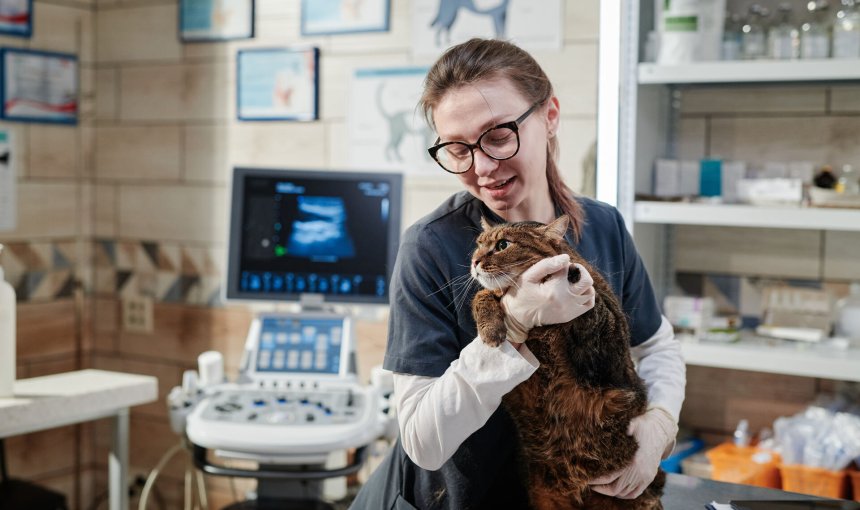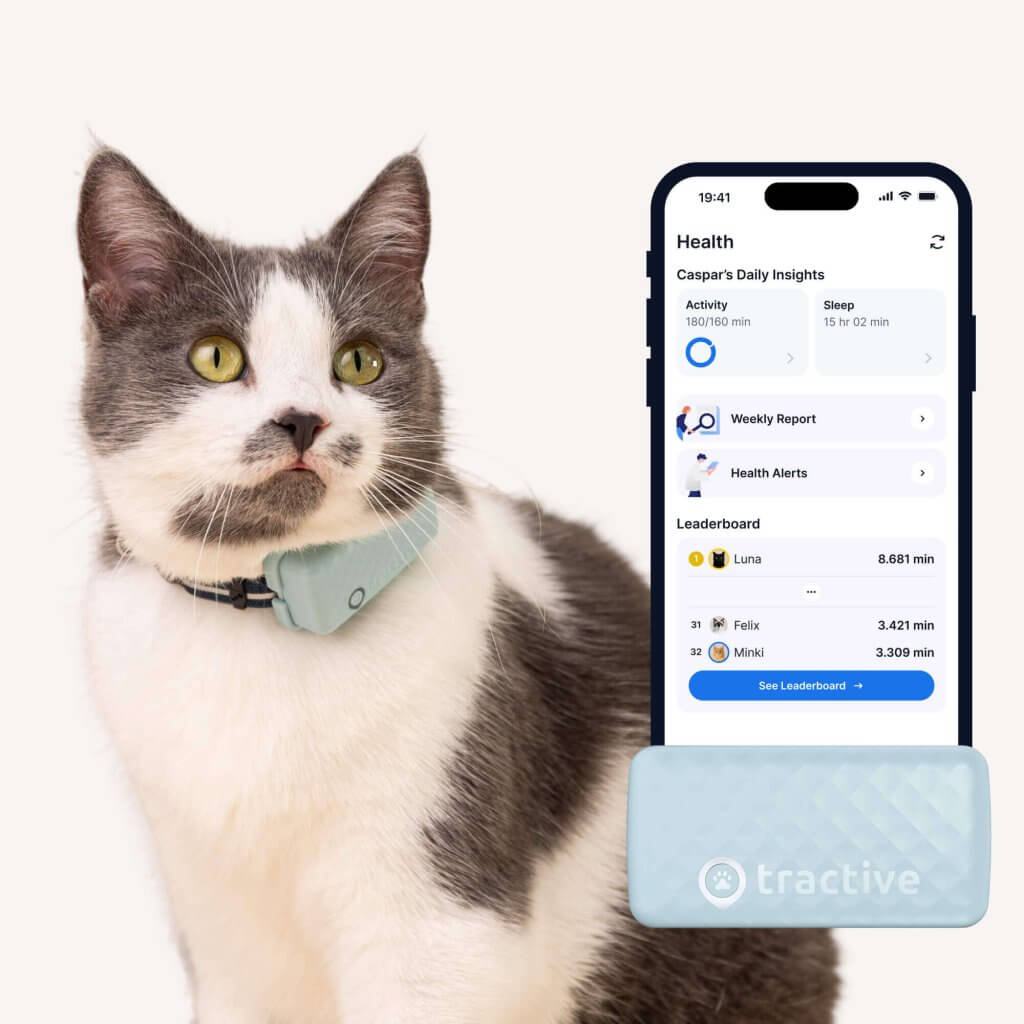Pet Insurance For Older Cats: Protecting Your Senior Feline’s Health And Well-being
Help your cat get the best medical care as they age. Pet insurance can make veterinary visits easy to afford.

When your kitty cat snuggles on your lap while you relax on the couch, all is right with the world. But someday, your cat may show signs of aging, which means large vet bills may be looming in your future. How will you pay for your furry friend’s care?
Pet health insurance may be just the answer for your older cat. A pet insurance policy can cover the cost of treatment when your cat becomes ill, giving you peace of mind while reducing your financial burden.

Find out where your cat spends their time.
Read moreDoes the age of a cat matter for getting insurance?
Age is one factor that pet health insurance companies use to determine the cost of their product. That’s because as cats age, they are more likely to need veterinary care. Many insurers consider cats to be seniors above age seven to 10. Some insurance companies impose an upper age limit, above which they will not insure your older dog or cat.
Is pet insurance for older cats worth it?
Just like humans, older pets usually require more frequent and more expensive health care. You’ll do anything to help your fluffy friend, but the price tag for all those treatments can be shocking.
Pre-existing conditions are important when deciding whether to get older cat insurance. If your cat has pre-existing conditions, these illnesses will be excluded from coverage by most insurance companies. That means you will pay the vet fees for any treatment of these conditions, even if you have pet insurance.
Only you can decide if cat insurance or dog insurance is worth it as your senior pet grows old. But when you do the math, you may realize that pet health insurance will save you money in the long run.
Why can insurance for older cats be more expensive?
The older your pet becomes, the more likely they will suffer from diseases or chronic health problems. Thus, the insurance company charges higher rates for senior cats because there is a greater risk they will need some type of treatment.
Rather than wait until your cat becomes elderly or gets sick, it may be best to purchase a pet health insurance policy when your cat is young and healthy. Your premiums will be much lower than waiting until your cat is older. Every insurance provider has different terms, so read the policy documents carefully to understand what is covered and what isn’t.
Common conditions in older cats
Cats can stay in good health for many years as long as they eat a healthy diet and stay active. But for many cats, reaching the senior years means they will need extra veterinary care to maintain their quality of life. Some of the most common conditions seen in older cats include:
Dental care and oral health considerations
Many older cats suffer from gum disease or need to have multiple teeth extracted. Not only is this painful for your cat, dental disease can affect their overall health.
Chronic renal disease
Kidney failure, also called chronic renal disease, is not curable, but it can be managed with medications, fluid therapy, and dietary changes. The prognosis improves if this condition is diagnosed early, before it progresses.
Heart disease
Genetics, body weight, activity levels, and diet may play a role in the development of heart disease in cats. Sometimes, cats may have congenital disease where heart defects are present at birth. Heartworm in cats can lead to heart disease as well.
Kidney and urinary tract health
Urinary tract infections (UTIs), bladder stones, and urethral obstructions can cause problems with your cat’s urinary tract and kidneys. UTIs can be treated with antibiotics, but some conditions may require imaging or surgery to treat.
Cognitive decline and behavioral changes
Cats can suffer from feline dementia, known as cognitive dysfunction syndrome. Affected cats experience changes in awareness, memory loss, and become less responsive to sights, sounds, smells, and other stimuli.

Get health alerts for your cat
Our cats can’t always tell us if something’s wrong. But if their tracker detects unusual changes in their routine, you’ll get an alert, helping you catch potential issues early.
Factors to consider when choosing pet insurance for senior cats
Selecting the right insurance for your senior cat can be daunting. You need to understand the type of cover you will receive, the health conditions your cat has, and the cost of the pet insurance policy. Look for an online insurance emporium that compares and rates pet insurance policies so you can explore all your options for older pet insurance.
We created this guide to choosing the right pet insurance provider to help you get started.
Types of pet insurance policies available for your senior cat
You have several cover options when choosing insurance for your senior cat. As you research policies, read the policy documents carefully to understand exactly what type of coverage you are buying.
- Lifetime pet insurance can be purchased at any time during your pet’s life, but is cheaper when your pet is young and healthy. Lifetime cover is the most expensive type of pet insurance, but your cat will receive lifetime cover for accidents and illness (not including pre-existing conditions) for as long as you continue to pay your lifetime policy premiums.
- Maximum benefit pet insurance covers accidents and illnesses up to a pre-set monetary annual limit. Once the upper limit is reached, you can’t file a claim for the condition again. Therefore, max benefit cover may not be the best choice for older cats, who tend to develop chronic health issues that require treatment for years.
- Time limited pet insurance covers accidents or illnesses for 12 months or a set financial cap. Time limited cover is more suited to younger cats without chronic health issues.
- Accident only pet insurance only covers injuries related to accidents such as lacerations or broken bones. Your senior cat is unlikely to need this type of coverage, but it can be helpful for younger cats and kittens.
Pre-existing condition coverage
Most pet insurance policies do not cover pre-existing conditions. So if your cat is diagnosed with chronic renal disease before you buy your policy, you will not be able to make any claims for costs related to this condition.
Coverage limits and exclusions for senior-specific conditions
Kidney failure, thyroid conditions, diabetes, dental issues, or cancer can occur in senior cats. Some pet insurance companies do not cover all of these conditions. Make sure you understand what type of medical conditions are excluded if you are purchasing insurance for your senior cat. Keep in mind that some policies have lifetime or annual limits on the amount of money they will pay out for certain treatments.
Some cat breeds including Siamese, Bengal, Manx, and Persian breeds are at risk for certain health conditions as they age. Some pet insurance policies may not cover these conditions, no matter how old your cat is. Read the fine print of your policy to avoid surprises.
Deductibles, premiums, and reimbursement levels
Pet insurance is similar to the health insurance you purchase for yourself. Each month, you pay a premium for the cover. If your cat requires treatment, you pay the veterinarian. Then you send your itemized receipt to your pet insurance company. Once your claim is approved, you are reimbursed for a portion of the vet fees, minus your deductible.
Each company and policy type varies, so read all the policy documents carefully to understand exactly what is and isn’t covered.
Check out our step-by-step guide to understand how pet insurance works.
Tips for maximizing senior cat insurance
Older pet insurance is important, but regular vet visits, healthy food, appropriate exercise, and basic pet care can help to stave off age-related health conditions in your senior pet.
Regular senior-specific check-ups and screenings
Pet owners should take their dogs and cats to the vet at least once a year for an annual check-up. Senior pets should see the vet twice a year to head off health issues associated with advanced age.
Balanced nutrition and weight management
Obesity in pets is associated with diabetes, joint problems, and chronic pain, as well as lower life expectancy. Ask your veterinarian for advice on exactly how much food to offer your cat daily and lower their risk of obesity and associated problems.
Dental care and oral hygiene practices
Poor dental hygiene creates a risk for infection and tooth loss. Stay ahead of tooth trouble by scheduling regular cleanings at the vet’s office.
Managing chronic conditions and medications
If your cat is diagnosed with a chronic condition such as kidney failure or diabetes, it’s important to follow your veterinarian’s instructions for daily home care. If medication is prescribed, be sure to follow the correct dosage and timing.
Some cat breeds including Siamese, Bengal, Manx, and Persian breeds, are at risk for certain health conditions as they age. Ask your veterinarian what to watch for in your senior purebred kitty.
Creating a cat-friendly environment for comfort and safety
As your cat ages, they may become less adventurous and need more attention from you, their favorite human. Keep an eye on your kitty for changes in their eating, grooming, and litter box habits. Changes in these areas can signal an underlying health problem that your veterinarian can investigate.
Get help managing your senior cat’s health with pet insurance
Your kitty has been by your side (or on your lap) for so many years, it’s hard to recognize that they are growing older and may need more care as they age. A cat insurance policy can give you peace of mind, because you know you’ll be able to afford to take care of your fluffy friend as they enter their golden years.



